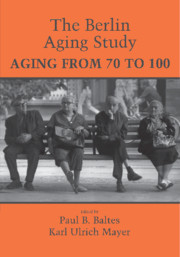Book contents
- Frontmatter
- Contents
- Acknowledgments
- Introduction
- Part A Theoretical Orientations and Methods
- Part B Major Results from the Four Research Units
- Part C Interdisciplinary Findings
- 9 Men and Women in the Berlin Aging Study
- 10 Social Relationships in Old Age
- 11 Self, Personality, and Life Regulation: Facets of Psychological Resilience in Old Age
- 12 Limits and Potentials of Intellectual Functioning in Old Age
- 13 Sensory Systems in Old Age
- 14 Everyday Competence in Old and Very Old Age: Theoretical Considerations and Empirical Findings
- 15 On the Significance of Morbidity and Disability in Old Age
- 16 The Utilization of Medical and Nursing Care in Old Age
- 17 Sources of Well-Being in Very Old Age
- Part D Overview and Outlook
- Notes on Contributors
- Abbreviations
- Author Index
- Subject Index
16 - The Utilization of Medical and Nursing Care in Old Age
Published online by Cambridge University Press: 06 December 2010
- Frontmatter
- Contents
- Acknowledgments
- Introduction
- Part A Theoretical Orientations and Methods
- Part B Major Results from the Four Research Units
- Part C Interdisciplinary Findings
- 9 Men and Women in the Berlin Aging Study
- 10 Social Relationships in Old Age
- 11 Self, Personality, and Life Regulation: Facets of Psychological Resilience in Old Age
- 12 Limits and Potentials of Intellectual Functioning in Old Age
- 13 Sensory Systems in Old Age
- 14 Everyday Competence in Old and Very Old Age: Theoretical Considerations and Empirical Findings
- 15 On the Significance of Morbidity and Disability in Old Age
- 16 The Utilization of Medical and Nursing Care in Old Age
- 17 Sources of Well-Being in Very Old Age
- Part D Overview and Outlook
- Notes on Contributors
- Abbreviations
- Author Index
- Subject Index
Summary
The increasing number of older people in Western societies has made dealing with their needs for help and care a pressing matter. In the interdisciplinary context of the Berlin Aging Study (BASE), involving geriatricians, psychiatrists, psychologists, and sociologists, it was possible to examine how older adults utilize health care and which predicting factors are important.
Major areas of health care utilization are: (1) physician contacts, (2) medication use, (3) different levels of caregiving, including informal, formal, and institutional care, and (4) inpatient treatment for acute illness episodes in hospitals. Results from the BASE assessments show that 85% of persons aged 70 and above had regular physician contact and that 96% used at least one medication. Thirty-one percent received some kind of informal or formal caregiving assistance. Multiple regression analyses revealed differential predictive relationships for each of the three dependent health care utilization variables. Higher use of medications was most strongly predicted by increased numbers of somatic diagnoses, better intellectual functioning, and particular health attitudes. Physician contact was weakly predicted by somatic health variables, hypochondriasis, and living alone. In contrast, living alone was the strongest predictor of the utilization of caregiving services, whereas children living in Berlin served as a protective factor against the need for more formal care. Thus, utilization of health care is a multidimensional phenomenon that continues to depend on the interaction between physical and mental health, attitudinal, and social factors in old age.
- Type
- Chapter
- Information
- The Berlin Aging StudyAging from 70 to 100, pp. 430 - 449Publisher: Cambridge University PressPrint publication year: 1998

